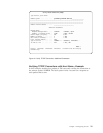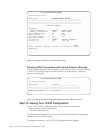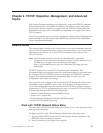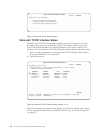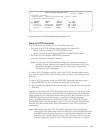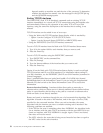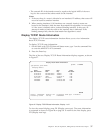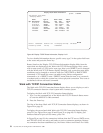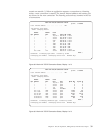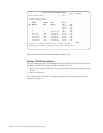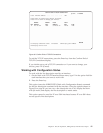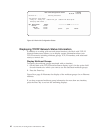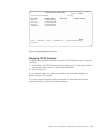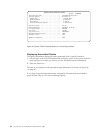
v The network ID of the interface must be equal to the logical AND of the next
hop for the route and the subnet mask for the interface.
Notes:
1. If the next hop of a route is identical to an interface’s IP address, that route will
never be bound to another interface.
2. When starting interfaces (if all interfaces are currently inactive) routes are
bound to the interfaces with the same best-match-first algorithm. An exception
is if the route is defined with a preferred binding interface. In this case, an
attempt is made to bind the route to the interface that is indicated. If the
binding attempt fails, then the best-match-first algorithm is used.
Display TCP/IP Route Information
The display TCP/IP route information function allows you to view information
about TCP/IP routes.
To display TCP/IP route information:
1. On the Work with TCP/IP Network Status menu, type 2 on the command line
or enter the WRKTCPSTS *RTE command.
2. Press the Enter key.
The first of the two Display TCP/IP Route Information displays appears, as shown
in Figure 27.
To view the second display, press F11 (Display route type). The route information
is presented as shown in Figure 28 on page 38. To return to the first display, press
F11 (Display next hop).
Display TCP/IP Route Information
System: SYSNAM04
Type options, press Enter.
5=Display details
Route Subnet Next Route
Opt Destination Mask Hop Available
9.125.87.0 255.255.255.0 *DIRECT *YES
9.125.87.0 255.255.255.0 *DIRECT *YES
9.125.109.3 *HOST 9.125.87.17 *YES
127.0.0.0 255.0.0.0 *DIRECT *YES
*DFTROUTE *NONE 9.125.87.169 *YES
*DFTROUTE *NONE 9.125.87.250 *YES
Bottom
F3=Exit F5=Refresh F6=Print list F11=Display route type F12=Cancel
F13=Sort by column F17=Top F18=Bottom
Figure 27. Display TCP/IP Route Information, Display 1 of 2
Chapter 2. TCP/IP: Operation, Management, and Advanced Topics 37



